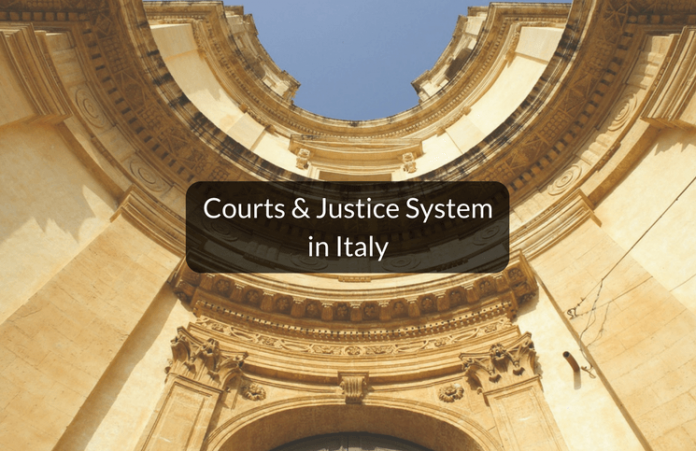In this blog post, Rajan S, pursuing M.A. in business law from NUJS, Kolkata, talks about the hierarchy of courts & justice system in Italy.
The judicial system in Italy is based on the Civil Law and it is unified. As like most of the countries the function of a judge and the public prosecutor is governed by the members of the judiciary. It consists of succession of courts and a body of judges.
The following areas are the breakdown of judicial functions:
- Civil and criminal
- Accounting
- Administrative
- Taxation
- Military
The magistrates in accordance to the judicial order would exercise the civil and criminal matters. Magistrates are fulfilling their roles as a judge and the investigators respectively.
The State Auditor’s court will exercise the accounting concerns. The general prosecutor office is based in the same court.
Regional administrative courts and council of state exercises the administration dealings.
Provisional Taxation Commissions and the District Taxation Commissions are responsible for the taxation matters.
Military courts, the military appeals court and the surveillance military court would take care of the military affairs. The military prosecutor will be based at military courts and general military prosecutors are based at the military appeals court.
Civil Courts
This courts deals in disputes between private bodies or private and public. The justice is bestowed in order by the justices of peace, judges, tribunals, appeal courts and the Supreme Court.
Administrative Courts
This courts have two functions:
- Protection of individual interests with public interests
- The control of public funds
Ministry of Justice is in charge of court administration among the government structures. Administrative and organizational functions are carried out by the Ministry of Justice. The responsibility of assigning the personnel to judicial services is function of the administration.
The magistrates are assigned to courts as per their personal choice of area of competence followed by very tough public examination. The magistrates cannot be assigned, promoted, removed, transferred without consultation of the superior council of magistrates (Consiglio Superiore della Magistratura or CSM). The CSM must evaluate all the matters related to the magistrates to protect the independence of the magistrates and their status.
The President of the Italian Republic is also president of the CSM.
The apex of the court is Chief Magistrate who is in charge of judiciary and has the authority on office decisions. A court manager will take care of public and internal assistance to judges and prosecutors.
Criminal Courts
The legal process in this court involves judges, tribunals and hearing courts. Once a trial has been decided and verdict passed, a party found guilt can appeal to an appeal court, further, he can approach the supreme court in case of failure in appeals in appeal court which qualifies on the ground of misinterpretation of laws.
In case you have been arrested for any offence, you are not supposed to appoint any lawyer prior to a hearing from judge. However, you reserve the right to state only your basic details such as name, date of birth and history about imprisonment in Italy. There is a possibility that you will be held for a maximum of three days before a hearing. In serious cases it is very difficult to get bail and you will be held for three years without trial.
If you lost any property or your belongings have stolen, you need to make a report about the incident and it is very essential to claim an insurance.
Hierarchy of courts
The cases start from the hearing courts, appeal courts and the Supreme Court. The apex among all the courts is the supreme court.
The following are the setup or hierarchy :
Initial proceedings
- The minor hearings of civil and criminal matters would be by Justices of the Peace (JP)
- The criminal case involves penal justice would be dealt by the penal office.
- The severe case hearings are by the tribunals or the court.
- Hearing are also dealt by Juvenile Court.
Chief prosecutors also plays the role of public prosecutor in first trials.
Appeal or second instance to claim against the first decisions
- Appeals courts will interpret the conclusion of hearing court.
- Second instance courts in concern involving penal justice would be by penal tribunals.
Chief prosecutors also plays the role of public prosecutor in second instance.
Final or highest level of infringement of the law
- The final interpretation of law on justice and the final verdict will be exercised by the Supreme Court.
The Attorney Generals of the Supreme Court plays the public prosecutor,s role in final instance.
Do you have something to say? Feel free to comment below & share the article.
 Serato DJ Crack 2025Serato DJ PRO Crack
Serato DJ Crack 2025Serato DJ PRO Crack









 Allow notifications
Allow notifications


